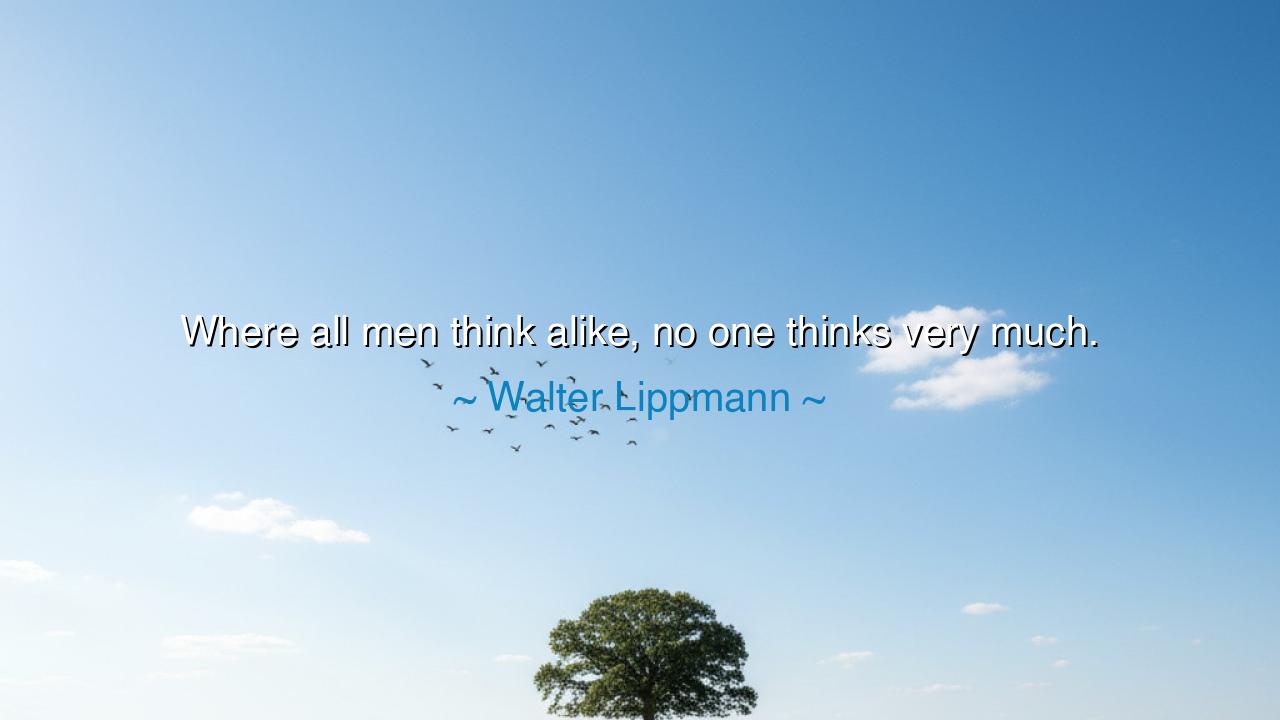
Where all men think alike, no one thinks very much.






The words of Walter Lippmann strike like a bell that echoes through the corridors of human history: “Where all men think alike, no one thinks very much.” In this truth we see the peril of conformity, the silent death of wisdom that comes when minds cease to question and only mirror one another. For thought, by its very nature, is born of struggle—of clash, of questioning, of wrestling with doubt. When all voices sing the same song without discord, there is no harmony, only dull monotony, and the flame of genuine insight is extinguished.
The origin of these words rests in Lippmann’s role as a political commentator and philosopher of democracy. He saw in his own age, as in ours, the danger of public opinion becoming a tide that sweeps away individual reasoning. He understood that societies thrive not on uniform thought but on the tension of debate, on the friction of disagreement that sharpens the mind like iron upon iron. A people who all think alike do not think at all—they merely obey the momentum of the crowd, and in doing so, they surrender their freedom.
The ancients themselves warned of this peril. Socrates, who lived in Athens, faced death because he dared to question what others accepted. His crime was not impiety nor corruption, but rather his refusal to think like everyone else. The Athenians, in their unity of suspicion, silenced the one who truly thought. And yet, it is his name that endures as a beacon of philosophy, while the collective judgment of his city has become a warning for all ages. In this we see Lippmann’s wisdom: when all minds agree, wisdom often perishes.
History provides us also the example of Galileo. The world around him insisted that the sun revolved around the earth, and the great weight of authority pressed down upon him to conform. But Galileo thought differently, and in his difference, he discovered truth. For centuries the masses had thought alike—but they had not thought deeply. It was the solitary mind that dared to stand apart which carried the torch of progress into the future.
Lippmann’s words are also a warning about the seductive power of comfort. It is easier, after all, to agree than to question, to repeat than to explore, to remain silent than to dissent. To think very much is to risk loneliness, to bear the weight of ridicule, and sometimes even to face danger. But it is in that risk that greatness is found. Those who dare to think differently become the architects of tomorrow, while those who blend into sameness fade into the background of history.
The lesson for us is profound: value the voice that challenges you. Do not despise disagreement, for it is the mother of wisdom. In your own life, do not measure your thoughts by their agreement with the majority, but by their fidelity to truth. Seek conversation with those who differ, and let friction sharpen your understanding. Beware the ease of conformity, for it lulls the mind into slumber. True thought awakens where diversity of voice is honored.
Practical action lies within our reach: read widely, especially voices that challenge your beliefs. Ask questions where others remain silent. Cultivate communities where disagreement is welcomed, not feared. And when you find yourself surrounded by those who all think alike, pause and ask: are we thinking, or are we merely echoing one another? In that question lies the seed of freedom.
So let us remember Lippmann’s wisdom: “Where all men think alike, no one thinks very much.” Let us not seek the comfort of sameness, but the vitality of difference. For it is in the clash of ideas that truth emerges, in the boldness of questioning that wisdom is born, and in the courage of individuality that humanity moves forward.






AAdministratorAdministrator
Welcome, honored guests. Please leave a comment, we will respond soon